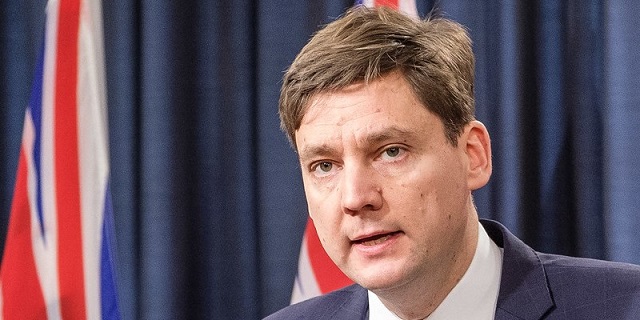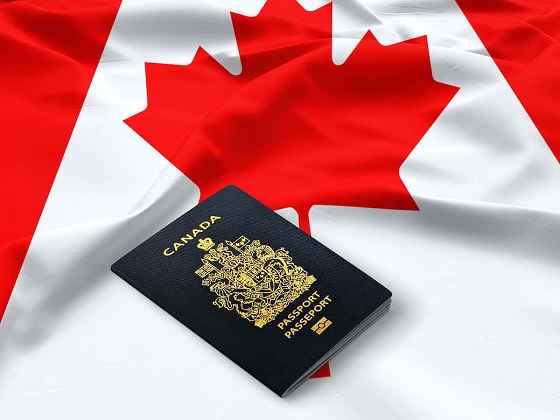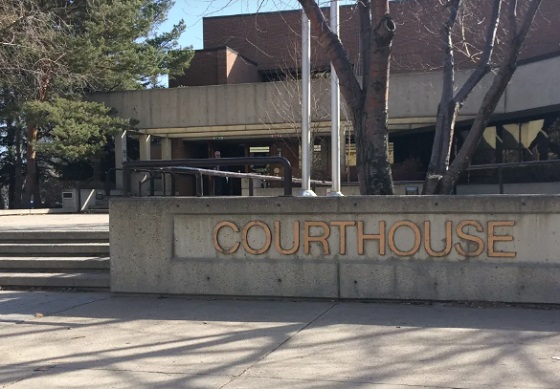Alberta
Alberta and B.C. budgets represent two different approaches to government finances

From the Fraser Institute
By Grady Munro and Tegan Hill
” for every $1 of additional revenue enjoyed by both provinces, the Eby government increased spending by more than $6 compared to 79 cents for the Smith government. “
In its recent budget, the Alberta government promised a new approach to provincial finances, with spending restraint and limited debt accumulation. While there’s still work to do, this is a far better approach than the reckless spending and massive debt accumulation of the British Columbia government.
The Smith government projects a $367 million surplus in 2024/25, followed by two more surpluses of $1.4 billion in 2025/26 and $2.6 billion in 2026/27. The government plans to use these surpluses largely to pay down debt, so although provincial net debt (financial assets minus liabilities) is expected to rise slightly in 2024/25 due to increased long-term capital spending (e.g. schools and highways), the debt is projected to decrease 4.1 per cent ($1.7 billion) from 2023/24 to 2026/27.
Alberta’s strong fiscal outlook is largely driven by historically high resource revenues. But while the government plans to increase program spending (total spending minus debt interest costs) nominally over the next three years, spending will grow at a slower rate than population growth and inflation—meaning spending will decline on an inflation-adjusted per-person basis.
The Smith government still must better align spending with stable revenues, but this is an important step in the right direction.
By contrast, B.C.’s 2024 budget projects a $7.9 billion deficit in 2024/25 followed by deficits of $7.8 billion in 2025/26 and $6.3 billion in 2026/27. These deficits, combined with borrowing for capital projects, will drive a projected $55.1 billion (74.7 per cent) increase in provincial net debt from 2023/24 to 2026/27. As a result, the level of net debt projected in 2026/27 ($128.8 billion) is nearly triple the level recorded in 2019/20 ($46.9 billion).
These deficits are due to a substantial increase in provincial spending by the Eby government. Indeed, similar to Alberta, B.C. has recently enjoyed an unexpected surge in revenues, but unlike the Smith government, the Eby government has shown no spending restraint.
From 2023/24 to 2025/26, revenues in B.C. will be a projected $2.0 billion higher than the government projected in last year’s budget, yet the plan for spending over that same period increased by $13.2 billion. For comparison, the Smith government also increased spending in these years relative to its 2023 budget, but did so by $2.1 billion less than the increase in revenues.
In other words, for every $1 of additional revenue enjoyed by both provinces, the Eby government increased spending by more than $6 compared to 79 cents for the Smith government.
The consequences of B.C.’s approach are clear. By spending far outside its means, the Eby government will saddle future generations of British Columbians with tens of billions more in debt that must be financed through taxes. For perspective, debt interest payments will nearly cost a projected $1,000 per British Columbian by 2026/27—that’s taxpayer money no longer available for programs or services. Moreover, continued deficits weaken the government’s ability to deal with future challenges (such as an economic downturn) without taking on more debt and driving up interest costs.
The Alberta and B.C. budgets provide examples of two different approaches to government finances. While there’s more to be done, Alberta is moving in the right direction to help prevent debt accumulation. On the other hand, B.C. is massively increasing spending and debt, to the detriment of British Columbians now and in the future.
Authors:
Alberta
Canada’s postal service refuses to help with Trudeau’s gun ban buyback program: report

From LifeSiteNews
According to a report, Canada’s mail service notified the Trudeau government via a letter that it would not participate in the buyback scheme, citing safety concerns for its employees.
Canadian Prime Minister Justin Trudeau’s federal government crackdown on legal gun owners through a buyback scheme has hit a major roadblock after Canada Post, a federal-run institution, signaled it will refuse to participate in scooping up thousands of legally purchased firearms at the bequest of the government.
According to government sources in a recent Radio-Canada report, the Trudeau Liberals were hoping Canada Post would help collect approximately 144,000 “assault” and “military-style” firearms that were recently banned by the government. Canada Post currently delivers guns via mail that are legally purchased to those with firearms licenses.
The inside source, who chose not to be named, noted that Canada Post notified the Trudeau government via a letter that it would not participate in the buyback scheme, citing safety concerns for its employees.
According to the source, Canada Post is still talking with the federal government, with one idea being to allow it to transport guns but not oversee getting them from their legal owners.
“It’s a challenge, but we do not think this jeopardizes our timetable or the government’s desire to move forward,” said one source, adding, “We want the discussions to continue.”
As for the Trudeau federal government, it continues to say that having Canada Post be involved in the gun buyback is the “most efficient” as well as “least costly” way to get the guns back from owners.
Trudeau’s gun grab was first announced after a deadly mass shooting in Nova Scotia in May 2020 in which he banned over 1,500 “military-style assault firearms” with a plan to begin buying them back from owners.
Late last year, the Trudeau government extended the amnesty deadline for legal gun owners until October 30, 2025. It should be noted that this is around the same time a federal election will take place.
The Canadian government’s controversial gun grab Bill C-21, which bans many types of guns, including handguns, and mandates a buyback program became law on December 14, 2023, after senators voted 60-24 in favor of the bill.
In May 2023, Bill C-21 passed in the House of Commons. After initially denying the bill would impact hunters, Trudeau eventually admitted that C-21 would indeed ban certain types of hunting rifles.
Alberta and other provinces promise to fight Trudeau’s gun grab tooth and nail
On the same day news broke that Canada Post said it would not participate in Trudeau’s gun buyback, Alberta chief firearms officer Teri Bryant last Wednesday issued a statement saying, “We urge the federal government to abandon this ill-advised program and meaningfully consult the provinces as we work to address the actual causes of firearms crime.”
“Canadians are still waiting for concrete details about the federal firearms confiscation program that has been in the works since 2020, and Canada Post’s refusal to participate in the federal government’s firearms ‘buy-back’ program is just one more example of how little forethought or engagement has gone into implementation of this program,” Bryant said.
Bryant noted that the buyback will not “significantly improve public safety” because it does not target those “involved in criminal activity and gun violence, and Albertans can be assured that our government will continue to advocate for our law-abiding firearms community.”
“We believe in a principled and informed approach to firearms policy that preserves public safety and recognizes the immense responsibility that comes with firearms ownership,” she noted.
Bryant observed that the federal confiscation program is not only causing uncertainty for many firearms businesses, but it is also “pulling attention and resources away from programs and initiatives that would help address public safety.”
“It is also undermining public confidence in the fairness of our entire firearms regulatory scheme,” she added.
Indeed, LifeSiteNews reported in February that despite Trudeau’s crackdown on legal gun owners, Statistics Canada data shows that most violent gun crimes in the country last year were not committed at the hands of legal gun owners but by those who obtained the weapons illegally.
Alberta Premier Danielle Smith, along with premiers from no less than four additional provinces, are opposed to C- 21.
Late last year, Smith promised she would strengthen the gun rights of Albertans because of Trudeau’s gun grab.
Alberta
Alberta threatens to fight Trudeau government restrictions on Canada’s plastics industry

From LifeSiteNews
“If the federal government refuses to abide by the constitution, we will take them to court again to defend our jurisdiction and the thousands of Albertans who work in the petrochemical sector”
Alberta has rejected the Liberal government’s “unconstitutional” federal plastics registry and production limit.
In an April 25 press release, Alberta’s Environment Minister Rebecca Schulz promised to take Liberal Minister of Environment and Climate Change Steven Guilbeault to court over his proposal to create a plastics registry, mandating companies to report their plastic production and implementation.
“If the federal government refuses to abide by the constitution, we will take them to court again to defend our jurisdiction and the thousands of Albertans who work in the petrochemical sector,” Schulz declared.
“This unilateral announcement is a slap in the face to Alberta and our province’s petrochemical industry, and the thousands of Albertans who work in it,” she continued.
Guilbeault’s plan, set to be implemented in September 2025, would mandate that businesses record how much plastic they place on the market in addition to the amount of plastic waste generated on their commercial, industrial, and institutional premises.
Companies would then report that amount to the federal government. The plan exempts small businesses which produce less than one tonne of plastic each year.
However, Schulz explained that the registry would negatively affect Alberta, as “plastics production is a growing part of Alberta’s economy, and we are positioned to lead the world for decades to come in the production of carbon neutral plastics.”
“Minister Guilbeault’s proposal would throw all of that into jeopardy and risk billions of dollars in investments. This includes projects like Dow Chemical’s net-zero petrochemical plant in Fort Saskatchewan, a $9-billion project that will create thousands of jobs,” she warned.
Schulz further pointed out that the mandate will not reduce plastic production since countries such as China will produce more plastic to make up for Canada.
“If the federal government limits plastic production in Canada, other countries like China will just produce more. The only outcome that this federal government will achieve will be fewer jobs in Canada,” she explained.
Schulz’s statement comes after the November decision by the Federal Court to rule in favor of Alberta and Saskatchewan, declaring that Prime Minister Justin Trudeau’s government overstepped its authority by classifying plastic as “toxic” and banning all single-use plastic items, like straws.
Essentially, the ruling overturned Trudeau’s 2022 law which outlawed manufacturing or importing plastic straws, cutlery, and checkout bags on the grounds of government claims that plastic was having a negative effect on the oceans. In reality, most plastic pollution in the oceans comes from a few countries, like India and China, which dump waste directly on beaches or in rivers.
The November ruling was only one of two recent court rulings that have dealt a blow to Trudeau’s environmental laws.
The second ruling came after Canada’s Supreme Court recently sided in favor of provincial autonomy when it comes to natural resources. The Supreme Court recently ruled that Trudeau’s law C-69, dubbed the “no-more pipelines” bill, is “mostly unconstitutional.” This was a huge win for Alberta and Saskatchewan, which challenged the law in court. The decision returned authority over the pipelines to provincial governments, meaning oil and gas projects headed up by the provinces should be allowed to proceed without federal intrusion.
The Trudeau government, however, seems insistent on defying the recent rulings by pushing forward with its various regulations.
-

 CBDC Central Bank Digital Currency2 days ago
CBDC Central Bank Digital Currency2 days agoA Fed-Controlled Digital Dollar Could Mean The End Of Freedom
-

 Frontier Centre for Public Policy2 days ago
Frontier Centre for Public Policy2 days agoHow much do today’s immigrants help Canada?
-

 Alberta16 hours ago
Alberta16 hours agoPrincipal at Calgary Elementary School charged with possession of child pornography
-

 Fraser Institute16 hours ago
Fraser Institute16 hours agoFederal government’s fiscal record—one for the history books
-

 Alberta11 hours ago
Alberta11 hours agoAlberta threatens to fight Trudeau government restrictions on Canada’s plastics industry
-

 Alberta15 hours ago
Alberta15 hours agoRed Deer Company fined $360,000.00 after 2022 workplace fatality
-

 Brownstone Institute2 days ago
Brownstone Institute2 days agoThe Numbers Favour Our Side
-

 Bruce Dowbiggin15 hours ago
Bruce Dowbiggin15 hours agoIn Toronto The Leafs Always Fall In Spring: 2024 Edition







